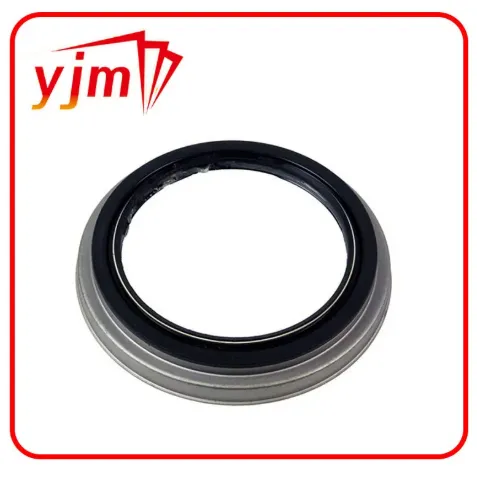Understanding the Importance of Oil Seals in Automotive and Industrial Applications
Oil seals play a critical role in the performance and longevity of mechanical systems, particularly in automotive and industrial equipment. They prevent the leakage of lubricants and keep contaminants out of crucial moving parts. Among the many types of oil seals, products like the valve oil seal, Victor oil seals, wall oil seal, wheel hub oil seal, and wheel oil seal are essential components in ensuring efficient and reliable operation.

The Role and Function of Oil Seals
Oil seals, also known as rotary shaft seals, are designed to close gaps between stationary and moving components in mechanical equipment. Their primary function is to prevent lubricant from escaping while stopping external contaminants—like dust, dirt, and moisture—from entering the system.
The valve oil seal for instance, is crucial in internal combustion engines. It regulates the amount of oil that lubricates the valve stem as it moves in the valve guide. A high-quality valve oil seal ensures minimal oil consumption and reduced emissions, helping engines run cleaner and more efficiently.
Similarly, Victor oil seals are known for their high performance and reliability. Manufactured by Victor Reinz, a respected name in gasket and sealing technology, Victor oil seals are used in a wide variety of automotive and industrial applications. They offer superior resistance to heat, pressure, and wear, which are essential qualities for high-performance engines.
Different Types of Oil Seals and Their Applications
Understanding the different types of oil seals can help in selecting the right one for a specific application. Here are some common types and their uses:
Valve Oil Seal
The valve oil seal is typically found in the cylinder head of engines. It is subjected to high temperatures and is critical for preventing oil from entering the combustion chamber. When these seals fail, the engine may burn oil, leading to smoke from the exhaust and decreased engine performance.
Victor Oil Seals
Victor oil seals are engineered with precision to meet OEM specifications. They are often used in engine rebuilds, transmission repairs, and differential service. Their material quality and advanced design make them ideal for both high-speed and high-load environments.
Wall Oil Seal
The wall oil seal (also known as a casing or housing oil seal) is typically used in industrial machinery. It is installed in the housing of a mechanical assembly and works by sealing around a rotating or reciprocating shaft. Wall oil seals are particularly effective in hydraulic systems and gearboxes, where they help maintain fluid pressure and prevent leakage.
Wheel Hub Oil Seal
A wheel hub oil seal is used in the wheel assembly of vehicles. Its main job is to keep wheel bearing grease inside the hub while blocking dirt and moisture from entering. Without a functioning wheel hub oil seal, bearings can quickly become contaminated, leading to premature failure and costly repairs.
Wheel Oil Seal
Similar to the hub seal, the wheel oil seal is critical for protecting the wheel bearing and axle. It provides a seal between the axle and the wheel hub, preventing lubricant loss and keeping harmful debris out. Over time, wheel oil seals may wear out or crack due to heat and friction, so routine inspection and replacement are essential for vehicle safety.
Importance of Selecting Quality Oil Seals
When it comes to oil seals, quality is not something to compromise on. Low-quality seals can result in leaks, contamination, and damage to vital components, leading to increased maintenance costs and downtime.
Here’s why choosing premium seals like Victor oil seals, or correctly fitting a valve oil seal, is important:
Material Integrity: High-quality seals use advanced materials like nitrile rubber (NBR), silicone, or PTFE that can withstand extreme temperatures and pressures.
Precision Fit: A properly fitted seal ensures maximum contact with shaft surfaces, reducing the chances of leakage.
Extended Lifespan: Durable materials and designs mean longer service intervals and better return on investment.
Performance Efficiency: Well-designed seals improve system efficiency, reduce friction, and minimize energy loss.
Moreover, whether it's a wall oil seal for industrial gearboxes or a wheel oil seal for automotive axles, using certified and tested products ensures compliance with safety standards and mechanical reliability.
In summary, oil seals may be small components, but their role is massive in maintaining the performance and integrity of mechanical systems. Whether you're working with a valve oil seal in an engine, fitting Victor oil seals for a rebuild, installing a wall oil seal in machinery, or replacing a wheel hub oil seal or wheel oil seal on a vehicle, selecting the right seal ensures smooth operation, efficiency, and longevity.
-
Simplifying Oil Changes: A Comprehensive Guide to Oil Drain Plugs and Their Variants
Știri Aug.04,2025
-
Mastering Oil Drain Maintenance: Solutions for Stripped, Worn, and Upgraded Oil Plugs
Știri Aug.04,2025
-
Fixing Oil Pan Plug Issues: Leaks, Stripped Nuts, and the Right Replacement Solutions
Știri Aug.04,2025
-
Everything You Need to Know About Oil Drain Plugs: Sizes, Fixes, and Upgrades
Știri Aug.04,2025
-
Choosing the Right Oil Drain Plug: A Guide to Sizes, Materials, and Drain Innovations
Știri Aug.04,2025
-
A Complete Guide to Automotive Drain Plugs: Types, Problems, and Innovative Solutions
Știri Aug.04,2025
-
The Ultimate Guide to Car Repair Kits: Tools and Essentials Every Driver Should Own
Știri Aug.01,2025
Categorii de produse















